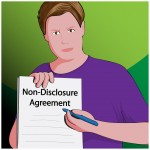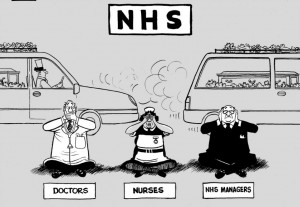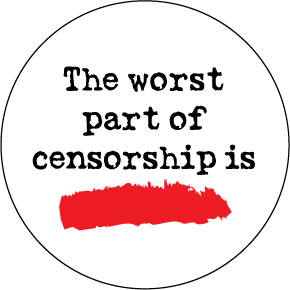
Here's a typical scenario: at your workplace, you report abuse, corruption or hazards to the public. As a result, you suffer reprisals, perhaps even losing your job. So you take your employer to court seeking compensation. The case is going to cost a huge amount of money, and your employer offers you a generous settlement. This is attractive, because it means you don't have to go to court. But there's a hitch. In the settlement agreement, there's a clause that bans you from saying anything about the settlement - and perhaps about the issues you raised originally.
Clauses like this, in legal agreements, are called confidentiality clauses. They can also be called gagging or silencing clauses.
You might say, "I'll agree to the settlement, but won't sign the confidentiality clause." Your employer might agree, but most do not. In fact, if you won't sign, they may not offer you any money at all.
With a gagging clause, you essentially accept money in exchange for a restraint on your free speech. Those with more money can, in this way, buy silence.
Gagging clauses are quite common. They affect many whistleblowers, and others too. Here I present five options for getting around gagging clauses.
Option 1: don't sign
Quite a number of whistleblowers refuse to sign gagging clauses. Some simply ask that the offending clause be removed, and employers agree. But when employers insist on including the clause, there is a difficult decision to be made.
Some individuals feel they have to sign. They have little money, and may have debts, including to their legal team. They may have to support children or parents. They may have disabilities and face destitution. A pay-out may be a lifeline, and they may feel obliged to sign. When it comes to a choice between family and free speech, family may have to take priority.
Confidentiality clauses also restrain the speech of employers. Some workers fear that if they don't sign, their employers may try to do more to damage their reputations and job prospects.
Luckily there are other options.
Option 2: inform others before signing
Before you sign the document containing the confidentiality clause, you can give others copies of all the information about your case. Legally, you are bound by the confidentiality agreement, but others are not: they haven't signed anything preventing them from speaking out.
The basic idea in this option is to enable others to speak out about the issues, including your experiences and the fact that you aren't allowed to speak. So make sure you provide them with plenty of material: documents, emails, and a summary of the issues. The summary is important because otherwise they might have a hard time understanding what it's all about.
Who should you give the material to? This depends a lot on the case and what you hope will happen afterwards. Generally, you should approach people who are trustworthy, knowledgeable and sympathetic, and include some who will take the initiative to speak out. You should pick some individuals who are independent and not vulnerable to pressure from your employer or from others who want to keep the issue quiet.
One advantage of this option is that it is entirely legal. Even so, your employer might demand that you contact everyone to whom you gave information and ask them to return any relevant documents and not to comment on the case. You can oblige. You ask recipients to return documents and request that they not comment. Just make sure that you gave the documents to people who will understand why you're asking them - and hence who will refuse your request.
Option 3: leak
Suppose you signed the deed including the confidentiality clause, and you did this before giving others copies of relevant documents. However, your employer probably doesn't know whether or not you circulated the documents prior to signing. So what you do is provide the documents to others, just as in option 2, except you have to be much more careful about it, so there is little evidence that you've done so.
For example, you can go to a public library, use a public computer, set up a new email account under a false name and send the documents to your favoured recipients. In this way, if your employer goes into your regular email account, there is no record of what you've done.

Similarly, you need to be careful about who you talk to, because your employer may be able to obtain records of telephone calls, perhaps not what you've said, but the numbers you called, and when and how long. This is what is called metadata. (It's also possible that your phone might be tapped. This is only likely if the stakes are high, for example involving high-level corruption.)
In general, you need to think through the likely ways that your employer might try to collect evidence, and use methods that avoid these.
Is it ethical? You may think, "I signed an agreement. I should stick with it." Yes, indeed, but you signed under duress, namely under the threat of losing a large amount of money. In such situations, the moral obligation to abide by the agreement is reduced or eliminated.
There's another consideration: confidentiality agreements are themselves questionable in a free society. Should anyone be allowed to sign away their right to free speech? If so, the implications would be far-reaching. It would mean that witnesses to crimes, abuse, misrepresentation and dangers could be paid to remain quiet. And of course that is exactly what is involved in many cases in which whistleblowers sign confidentiality agreements. They have spoken out about corruption (crimes), abuse or dangers to the public. Any law or arrangement that silences them is itself wrong, in that it aids and abets unethical, illegal and damaging behaviour.
In Britain, the national public interest disclosure act banned the use of gagging clauses. But that didn't stop many hospitals from imposing them on dissident health personnel. To obtain settlements, doctors and nurses were gagged, even though gags were outlawed. So who is in the wrong?

If you signed an agreement, it may be legally risky to break it, but - depending on the circumstances - ethically defensible.
Option 4: have nothing to lose
What happens if you signed a confidentiality agreement and you speak out in defiance of the ban? You might be sued by your employer, but this might not matter if you have nothing to lose. If you have no assets and not much income, you are in a good position to speak out. Your employer might take you to court, but with no money you decide not to defend. The court finds against you, but your employer can't collect the penalty.
It might be possible for the employer to charge you with a criminal offence, for example criminal defamation, but this would be unlikely. If it happens, you move to option 5.
You might decide to get rid of your assets, for example selling your house and giving away your money. You do need to live, though, and how to do this depends a lot on your circumstances. Perhaps your partner, family member or friend will support you. Another possibility is to move to another country, especially one where legal action from Australia is unlikely or ineffective.
Some people unfortunately have only a few months or years to live. For them, speaking out is relatively safe. By the time their employers get through the legal processes, they'll be dead and won't have to pay anything!
Option 5: attempt to make censorship backfire
A confidentiality agreement is a method of censorship. It is a restraint on free speech, and nearly everyone endorses the concept of free speech (even when hindering it in practice). Therefore, any attempt to prevent free speech may be seen as objectionable and potentially cause outrage.
The Hollywood celebrity Barbra Streisand learned the hard way that attempted censorship can backfire. Streisand's mansion at Malibu happened to be shown in an online collection of photos of the California coastline by photographer Kenneth Adelman. In 2003 she sued Adelman and a photo sales company for invasion of privacy, asking for damages of $50 million. When her legal action was publicised, it generated huge interest in the photo. Prior to the publicity, the photo had been downloaded just six times. Afterwards, it was downloaded hundreds of thousands of times. Subsequently, counterproductive online censorship has been dubbed "the Streisand effect." Dozens of examples are listed on Wikipedia.
Similar dynamics can occur with confidentiality agreements. Phillip Bonaffini's wife died after an operation at Bridgeport Hospital in the US. He sued the hospital for failing to follow procedures to prevent infections. The case was settled and he signed a confidentiality agreement. Later, Bonaffini was reported in the Chicago Tribune commenting about hospital infection prevention. Bridgeport Hospital considered this a violation of the settlement agreement and sued. However, when its legal action was publicised, Bonaffini received sympathy. The hospital was seen as being vindictive towards a grieving widower. After the publicity, it quickly withdrew its legal action.
Although censorship can backfire as in the Streisand and Bridgeport Hospital cases, these are the exceptions - there are vastly more cases in which censorship does not cause much concern. Censors have a variety of means to reduce outrage, for example by denigrating or intimidating the target of censorship. Furthermore, it can be costly to stand up to censorship.
For anyone who signs a confidentiality agreement under duress and decides that the injustice involved needs to be openly challenged, it is worth considering how to invoke the Streisand effect, namely make the gagging clause backfire. It is important to be able to publicise the issues - what you originally spoke out about, such as corruption, abuse or hazards to the public - through the mass or social media, getting to a large number of people, some of whom will be outraged by the information. The greater the publicity, the harder it will be for your employer to be able to justify coming after you.
You should be prepared for attempts to disparage you by releasing damaging information, false claims and so forth. The more upright and open you have been, and the better your reputation with co-workers and friends, the harder it will be for your employer to discredit you.
Your employer may try to escalate intimidation by threatening serious legal action. You need to be prepared to stand your ground and continue obtaining publicity - including publicity about the legal threats. Challenging censorship, especially when a wealthy and powerful organisation is involved, is not for the faint-hearted. It is useful to remember that leaders of most organisations detest adverse publicity more than anything, and don't mind spending hundreds of thousands of dollars to prevent it. That, after all, is why companies offer generous settlements - with the addition of gagging clauses.

Summary
Gagging clauses are a blight on a free society. They are a type of bribery, buying silence about things that should be public. If you are put in the difficult situation of being asked to sign a gagging clause, you may be able to resist but, if not, it is worth considering other options. You can give your information to others in advance, which is entirely legal, but even after signing you may decide to provide your information to others, making sure this is done without leaving evidence. Finally, if you decide you really need to speak out, you should do what you can to make the gag backfire.
Acknowledgements
Thanks to the many whistleblowers who have shared stories of being gagged, and to Sue Curry Jansen and Cynthia Kardell for useful comments.
More information
See especially Sue Curry Jansen and Brian Martin, "The Streisand effect and censorship backfire," International Journal of Communication, vol. 9, 2015 - the Steisand and Bonaffini case studies are drawn from this article.
Gagging clauses in Britain's National Health Service: Phil Hammond and Andrew Bousfield, "Shoot the messenger,"Private Eye, 2011
"Leaking: practicalities and politics"
Brian Martin is vice president of Whistleblowers Australia and editor of The Whistle.
Go to